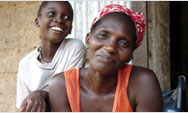USAID Awards Additional $100 million to Continue Development of Effective Microbicide
FOR IMMEDIATE RELEASE
September 9, 2008
Press Office: 202-712-4320
Public Information: 202-712-4810
www.usaid.gov
WASHINGTON, DC - USAID has awarded a five-year, $100 million cooperative agreement to the CONRAD Program of the Eastern Virginia Medical School to continue its development work on microbicides, bringing the total to date that USAID has awarded CONRAD to $160 million for microbicide research.
Safe and effective microbicides would provide women in the developing world with a powerful new tool to protect themselves from HIV and complement existing prevention methods. In the past two years the number of women living with HIV globally has increased by 1 million to 15.4 million. By the end of 2006, women comprised nearly half of the adults living with HIV and AIDS globally, but in sub-Saharan Africa, women and girls account for almost 61 percent of people living with HIV.
CONRAD is widely recognized as a leader in microbicide research and development. With continued support from USAID, the new CONRAD-Proprietary Products Research and Development (PPRD) program will further development of two proprietary products that, alone and in combination with other compounds, shows promise to help to prevent HIV and other sexually transmitted infections, as well as unplanned pregnancies. CONRAD-PPRD will also focus on the development of new biochemical markers of HIV transmission that may indicate early on whether or not a candidate microbicide will be effective. USAID's continued financial support of this research is critical.
"While it has not yet been demonstrated that any microbicide can prevent HIV transmission, the top priority of USAID is to support large-scale clinical trials of candidate microbicides to test whether they are safe and effective enough for women to use easily to reduce their risk of acquiring HIV," said Dr. Judy Manning with USAID. "CONRAD has particular expertise in preclinical and early clinical research, and we are glad to see the new agreement focused on this aspect of microbicide development."
USAID collaborates with the National Institutes of Health and Centers for Disease Control and Prevention as part of the U.S. Government's effort in microbicide research and development. In addition to CONRAD, USAID provides technical collaboration and funding to other organizations involved in microbicide research, including the World Health Organization, Family Health International, International Partnership for Microbicides, PATH, and the Population Council, among others. In 2008, support from Congress to USAID microbicide research and development grew to $42 million, representing a dramatic increase from an initial $12 million in 2001 and bringing the total amount of funding since the program's inception to more than $175 million.
For more information about USAID's work in microbicides, family planning and reproductive health, visit: http://www.usaid.gov/our_work/global_health/pop/.
The American people, through the U.S. Agency for International Development, have provided economic and humanitarian assistance worldwide for nearly 50 years.
Back to Top ^
|


